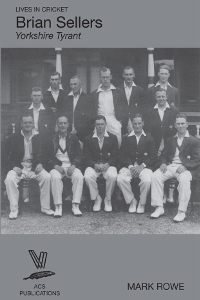Brian Sellers: Yorkshire Tyrant
Martin Chandler |Published: 2017
Pages: 148
Author: Rowe, Mark
Publisher: ACS
Rating: 3.5 stars

Some of those who have written biographies in the ACS Lives in Cricket series have taken on tough assignments. Not all their subjects have enjoyed particularly exciting lives and as a result the fruits of their labours, whilst being informative, have struggled to inspire. Unlike many ACS authors, Mark Rowe, currently the guiding hand of the series, is a professional writer. That gives him something of an advantage to start with, the more so given his ability to choose an interesting subject.
We have reviewed Rowe’s work before, the excellent Victory Tests from 2010, and of more recent vintage as well as from the ACS, 2016’s A Summer Field. A chapter on Brian Sellers certainly wouldn’t have been out of place in A Summer Field. He is a fascinating character and there is much of interest in his playing career and the more so outside it.
Sellers’ father was a successful industrialist, and his son never had to work for a living. That said he was certainly an extremely strong character. Any man who was not quite good enough to secure a place in a formidable side like Yorkshire’s on merit, and who owed his place to the traditional need for an amateur captain, took on a very difficult task. Not all managed to be anything other than a nominal captain whilst the senior pros made all the decisions. Sellers on the other hand, as Rowe explains, laid down the law to the professionals from the word go, and he never let up.
In truth Sellers wasn’t a bad batsman. He had a career average of just over 23. There were only four centuries in eleven seasons, although one was against the Australians. He was certainly an effective captain, in seven of his summers at the helm Yorkshire won the title. It is clear that his highly skilled charges had great respect for Sellers, although the evidence suggests they didn’t necessarily rate him as a tactician.
One curious feature of Sellers’ life, of which I was not previously aware, concerns the events of 1946. He was still Yorkshire captain, and led them to the Championship again in that first post-war summer. He was also an England selector, and helped choose the side that toured Australia under Wally Hammond that winter. It is remarkable therefore both that he could, and indeed did, then accept an offer from the Yorkshire Evening Post to travel to Australia and report on the series for them.
The clear conflict of interest seems not to have troubled Sellers, but his criticism (in fairness pretty mild by 21st century standards) of skipper Hammond certainly caused ripples at the time. For the 1947 season Sellers was no longer a selector, although two later stints in the role suggest no causal link. Rowe also throws out a couple of interesting suggestions for Sellers’ motivation for his comments, first that it may have been solidarity with the well to do Yorkshire family of the first Mrs Hammond (the divorce was ongoing during the tour) or that he had fancied the England captaincy for himself.
The end of his playing days most certainly did not spell the end of Sellers’ involvement in Yorkshire cricket and he soon became a committeeman and, from 1959 to 1972, chairman of the club. His firm and traditional values were always worn on his sleeve, and he never made any attempt to sugar coat anything. Inevitably he was heavily involved in the sacking of Johnny Wardle in 1958 and, later, was behind the departures from the club of Ray Illingworth and Brian Close. It is ironic that after being at the helm in one golden age of Yorkshire cricket, and then being in charge off the field during the county’s next period of dominance, his immediate legacy was to leave Yorkshire with the years of strife and austerity that were to haunt them during the closing years of the twentieth century.
I enjoyed reading Brian Sellers: Yorkshire Tyrant. Rowe is in tune with his audience, more particularly that they are going to open the book with a body of knowledge about its contents, and he does not therefore seek to reel in the casual reader. He presents the facts accurately and weaves in the opinions of others. With no agenda of his own he largely confines his own role to a few thought provoking asides, and the result is a most satisfying read.






Leave a comment